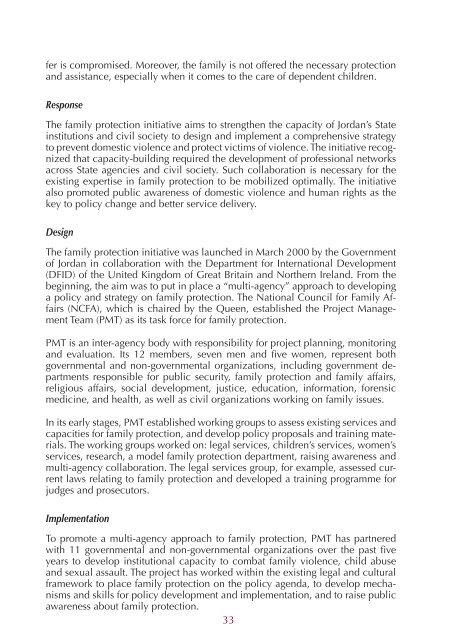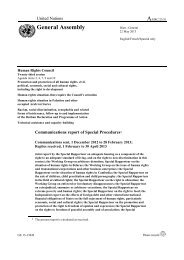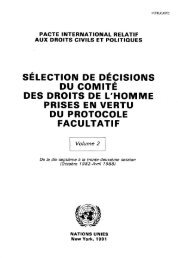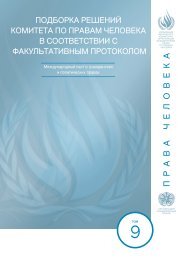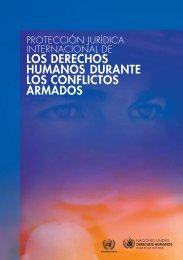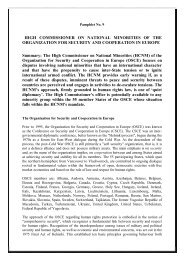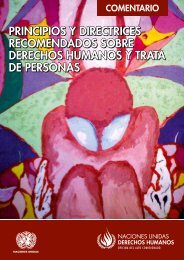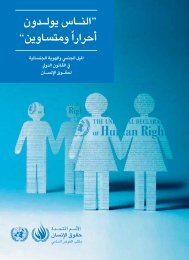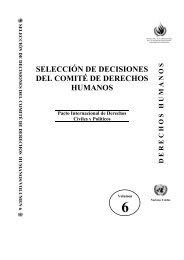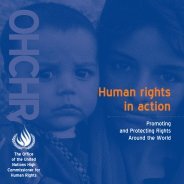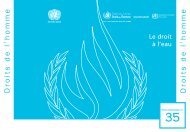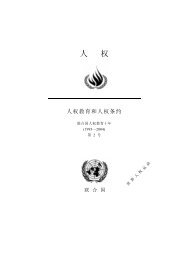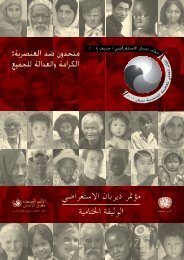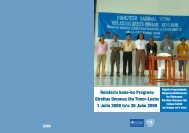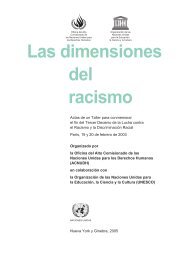good governance practices for the protection of human rights
good governance practices for the protection of human rights
good governance practices for the protection of human rights
Create successful ePaper yourself
Turn your PDF publications into a flip-book with our unique Google optimized e-Paper software.
fer is compromised. Moreover, <strong>the</strong> family is not <strong>of</strong>fered <strong>the</strong> necessary <strong>protection</strong><br />
and assistance, especially when it comes to <strong>the</strong> care <strong>of</strong> dependent children.<br />
Response<br />
The family <strong>protection</strong> initiative aims to streng<strong>the</strong>n <strong>the</strong> capacity <strong>of</strong> Jordan’s State<br />
institutions and civil society to design and implement a comprehensive strategy<br />
to prevent domestic violence and protect victims <strong>of</strong> violence. The initiative recognized<br />
that capacity-building required <strong>the</strong> development <strong>of</strong> pr<strong>of</strong>essional networks<br />
across State agencies and civil society. Such collaboration is necessary <strong>for</strong> <strong>the</strong><br />
existing expertise in family <strong>protection</strong> to be mobilized optimally. The initiative<br />
also promoted public awareness <strong>of</strong> domestic violence and <strong>human</strong> <strong>rights</strong> as <strong>the</strong><br />
key to policy change and better service delivery.<br />
Design<br />
The family <strong>protection</strong> initiative was launched in March 2000 by <strong>the</strong> Government<br />
<strong>of</strong> Jordan in collaboration with <strong>the</strong> Department <strong>for</strong> International Development<br />
(DFID) <strong>of</strong> <strong>the</strong> United Kingdom <strong>of</strong> Great Britain and Nor<strong>the</strong>rn Ireland. From <strong>the</strong><br />
beginning, <strong>the</strong> aim was to put in place a “multi-agency” approach to developing<br />
a policy and strategy on family <strong>protection</strong>. The National Council <strong>for</strong> Family Affairs<br />
(NCFA), which is chaired by <strong>the</strong> Queen, established <strong>the</strong> Project Management<br />
Team (PMT) as its task <strong>for</strong>ce <strong>for</strong> family <strong>protection</strong>.<br />
PMT is an inter-agency body with responsibility <strong>for</strong> project planning, monitoring<br />
and evaluation. Its 12 members, seven men and five women, represent both<br />
governmental and non-governmental organizations, including government departments<br />
responsible <strong>for</strong> public security, family <strong>protection</strong> and family affairs,<br />
religious affairs, social development, justice, education, in<strong>for</strong>mation, <strong>for</strong>ensic<br />
medicine, and health, as well as civil organizations working on family issues.<br />
In its early stages, PMT established working groups to assess existing services and<br />
capacities <strong>for</strong> family <strong>protection</strong>, and develop policy proposals and training materials.<br />
The working groups worked on: legal services, children’s services, women’s<br />
services, research, a model family <strong>protection</strong> department, raising awareness and<br />
multi-agency collaboration. The legal services group, <strong>for</strong> example, assessed current<br />
laws relating to family <strong>protection</strong> and developed a training programme <strong>for</strong><br />
judges and prosecutors.<br />
Implementation<br />
To promote a multi-agency approach to family <strong>protection</strong>, PMT has partnered<br />
with 11 governmental and non-governmental organizations over <strong>the</strong> past five<br />
years to develop institutional capacity to combat family violence, child abuse<br />
and sexual assault. The project has worked within <strong>the</strong> existing legal and cultural<br />
framework to place family <strong>protection</strong> on <strong>the</strong> policy agenda, to develop mechanisms<br />
and skills <strong>for</strong> policy development and implementation, and to raise public<br />
awareness about family <strong>protection</strong>.<br />
33


